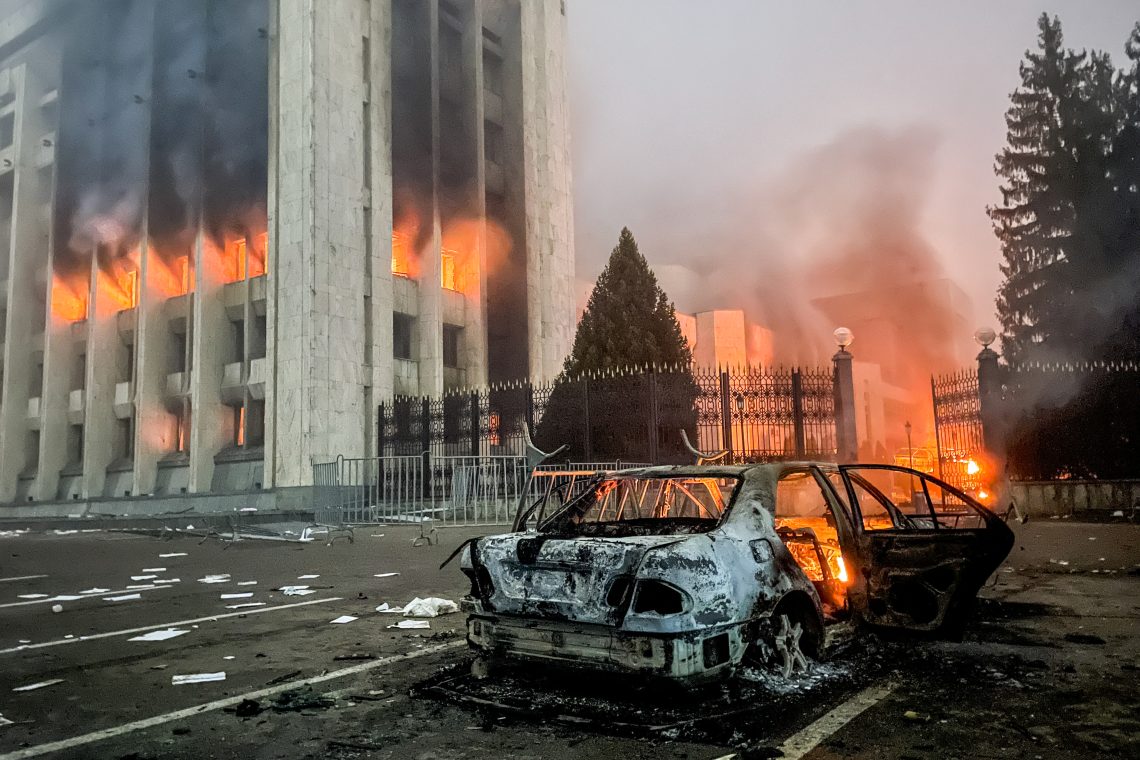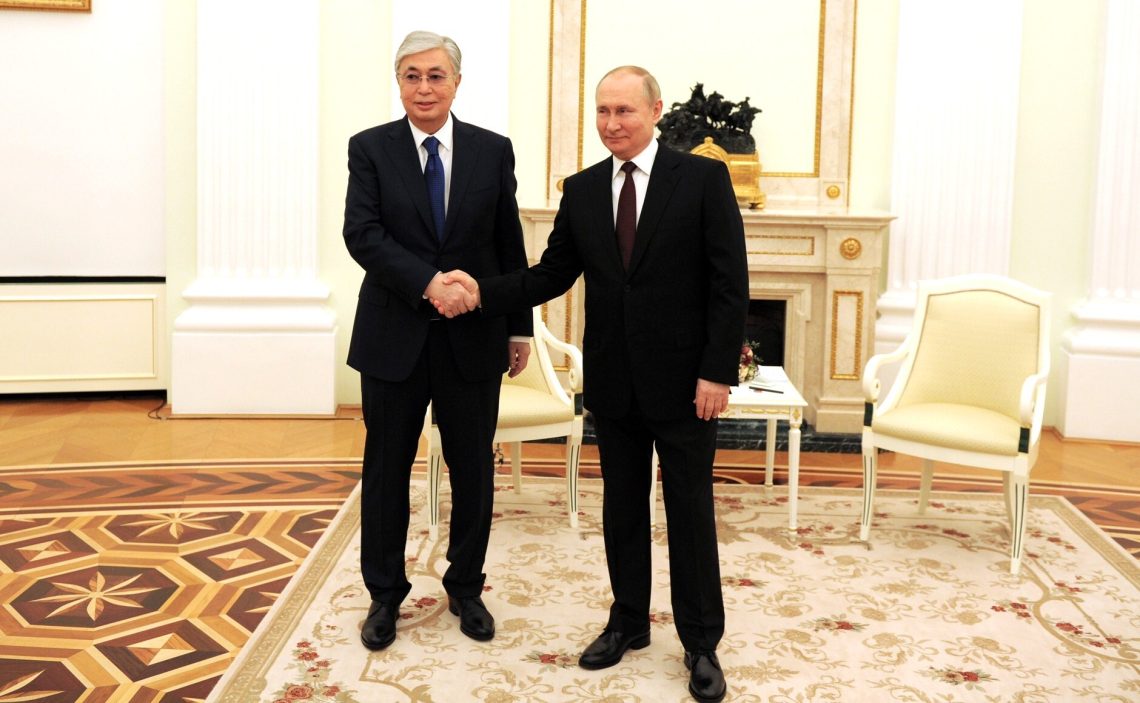The wider implications of the attempted coup in Kazakhstan
President Tokayev’s deadly suppression of the January 2022 uprising has sidelined ex-leader Nursultan Nazarbayev, left China wary and strengthened Russia’s hand.

In a nutshell
- President Tokayev’s suppression of the uprising leaves him in debt to the Kremlin
- Kazakhstan’s “authoritarian modernization” model suffered a major setback
- China’s influence has taken a hit, while Western firms may shy away
This is our second report in a two-part series about the uprising in Kazakhstan. Find our first report, focusing on Kazakhstan’s internal political situation and on the ramifications for Russia, here.
In Kazakhstan, the new year opened with violent social protest, leaving at least 227 people killed, according to official figures, before the demonstrations were finally suppressed on January 11, 2022. As looting and destruction spread across the country, from the western oil-producing areas to the former capital Almaty, the government responded with harsh repression – and with an unprecedented call for Russian military forces to intervene. Although order was quickly restored, the events may cause a profound geopolitical transformation of the Central Asian region.
The trigger was a hike in the price of liquefied petroleum gas, used by many residents of Kazakhstan in lieu of more expensive gasoline. Although the government responded by swiftly rescinding the price hike, it failed to prevent the initial outburst of anger from becoming a broader popular protest against corruption, poverty, inflation and social injustice.
What made these events so important was that the protest movement was hijacked by loyalists of former President Nursultan Nazarbayev, including his wealthy and well-connected nephews, one of whom was a deputy head of the security service. This caused the protest to morph into an attempted coup against the government, likely triggering the government’s appeal for Russian military intervention.
No outside involvement
Initial reactions underline that it arrived out of the blue. While the Russian reaction was to condemn it as a color revolution, sponsored from outside, Americans warned that once Russian forces had arrived, they would never leave. Both turned out to be wrong. There is zero evidence of outside involvement, and the Russian forces were gone in 10 days.
The crisis was like a volcanic eruption, the result of pressures being released that had been building for a long time.
The crisis was like a volcanic eruption, the result of pressures being released that had been building for a long time. It is the way in which those pressures were released – and contained – that suggests a fundamentally new game may be emerging.
The outcome was associated with three ominous firsts. One was President Kassym-Jomart Tokayev’s defiant response to the customary international calls for moderation. His public pronouncement that negotiating with bandits and terrorists was unacceptable may not have raised too many eyebrows. But his instruction to security forces to shoot to kill, with no questions asked, was a draconian response that must have impressed even people like Alexander Lukashenko, the master of repression in Belarus.
The second was the appeal for assistance from the Collective Security Treaty Organization (CSTO). Founded in 1992, as a Russia-led counterpart to NATO, its charter envisions mutual defense against outside aggression. No interventions have been made to secure internal order. The case of Kazakhstan suggests the Kremlin may now be looking at a more forceful role in maintaining order within what it refers to as its “sphere of privileged interest.”
The third was that China was swift in accepting Russian intervention, with no role for the Shanghai Cooperation Organization (SCO), which had been viewed as the main arena for security cooperation in Central Asia. Beijing’s acquiescence was important.

The combination of these three firsts suggests that Russian President Vladimir Putin has every reason to be pleased. Russia has cemented its role as regional hegemon and kingmaker, and the brutal repression in Kazakhstan sends a strong signal to opposition movements in other countries. Both represent important windfall gains. Yet, two further reasons suggest that there may also be a price to pay.
One concerns the handover of power that was orchestrated in 2019, when Mr. Tokayev was elevated to the post of president. This was made possible by President Nazarbayev’s decision to retire to his ceremonial post as “father of the nation” (a post created in 2010). Gestures such as renaming the capital Astana to Nur-Sultan suggested that he would continue wielding influence. He has now dropped out of public view. The implication is that if President Putin had contemplated stepping down when his term expires, in 2024, the likelihood of a transition of power in Russia has now been greatly diminished.
The second is that if Mr. Nazarbayev no longer rules behind the scenes, it is a major transformation. First elected in 1991, he had served as the Kremlin’s staunchest ally and as a trusted linchpin in its regional integration efforts. It is an open question if President Tokayev will show the same dexterity in managing external relations. Given Kazakhstan’s geographical location and petroleum-based wealth, the question of who formulates policy in Nur-Sultan is of major importance.
Nazarbayev’s legacy unglued?
The legacy from the Nazarbayev era that may now be coming unglued had three major components.
First and foremost was a successful sharing of the spoils from oil and gas extraction. This ensured stability among the predatory elites and was held at the time to be sufficiently robust to allow an orderly transition of power. If interests affiliated with the Nazarbayev clan have now lost out in the game for power, then this will also be played out in a reallocation of the spoils.
Russia has cemented its role as regional hegemon and kingmaker.
The second was that President Nazarbayev managed to preserve good relations with China. This entailed managing mounting popular dissatisfaction with matters that ranged from a heavy-handed Chinese presence inside Kazakhstan to Beijing’s repressive policies in Xinjiang, which have affected not only Uighurs but also ethnic Kazakhs.
The third was that he succeeded in placing ethnic Kazakhs in top official positions, without antagonizing the large minority of ethnic Russians that had been accustomed to holding such posts. And he succeeded in deflecting Russian threats of a “Ukrainian” scenario. The population in the northern part of Kazakhstan is heavily dominated by ethnic Russians, and Russian nationalists have long been calling for those territories to be “returned” to Russia, much as the Kremlin is presently threatening to annex Donbas in Ukraine.
Scenarios
The way in which President Tokayev prevailed has two potential geopolitical ramifications.
One is that a purge in the corridors of power has dealt a blow to Chinese influence. One of the key casualties of the crackdown was Karim Massimov. A former Nazarbayev loyalist, he had served as prime minister and a key liaison to China. He is now in prison, charged with high treason. The other is that the purge blocked the opposition’s ambition to mobilize radical Islamist groups against the regime. The price that President Tokayev will have to pay for these achievements is that he is now in hock to the Kremlin.
Looking at broader geopolitical implications, the main feature concerns the future of authoritarian modernization. Market development under such rule has scored tremendous successes in places like Taiwan and South Korea, where increasing material affluence has resulted in demands for important democratic values like accountable government, freedom of speech and respect for human rights, including rights to property and free association.
Many have also noted that the economic achievements of China have been scored despite communism, suggesting that the emergence of a wealthy middle class would again be associated with demands for greater democracy. No matter what will come of that, there is an important link from China to the post-Soviet world. In both cases, the prospects for combining authoritarian government with positive market development have rested on maintaining good relations with market economies in the West.
The case of Russia provides an illustration. In the early Putin regime, Western observers were so mesmerized by the growth potential of the Russian economy that they turned a blind eye to President Putin’s increasing authoritarianism, euphemistically referred to as “democratic backsliding.” As such hopes have been thwarted, the ambitions of other former Soviet republics to play a balancing game between Russia and the West are also called into question.
An outstanding case is Ukraine, where political elites spent the first decade of independence fighting over whether to associate with Russia or with the West. That infighting was resolved in 2014, when the “Revolution of Dignity,” which prompted Kremlin-backed President Viktor Yanukovych to seek exile in Russia, charted a course toward the West. Then followed the Russian invasion and annexation of Crimea, followed by military intervention in Donbas, culminating in open war in February 2022.
Belarus was involved in similar games of balancing Russia against Europe for even longer, causing mounting irritation on both sides. It came to a bloody end in 2020, when a rigged election caused mass protests that were met by massive repression, creating a total break in relations with the West. Since then, Belarus has been neatly folded into the Russian side, offering its territory as a launchpad for the invasion of Ukraine.
Kazakhstan offers a similar but still fundamentally different story.
It is similar in the sense of maintaining relations with all the major outside powers. Yet, it is different in not having played the sides off against each other. The strategy has been to maintain friendship with all sides: energy collaboration with the West, security cooperation with Russia and infrastructure investment from China. The path forward will not mark a total break with this tradition, but it is likely to sway toward increasing Russian influence.
During the Nazarbayev era, Kazakhstan was a source of positive news, for political stability and for rapid modernization. This was partly driven by gains from oil and gas extraction and by Chinese investment in the Belt and Road Initiative. But more important, in a longer-term perspective, was that the government pursued reforms aimed at improved governance.
In 2015, it adopted a program of institutional reform that came to be known as “the Singapore government program.” It reflected an ambition to import good governance from Singapore, where authoritarian rule had been combined with striking economic performance. A more recent manifestation of the same was the announcement in September last year of cooperation with Singapore to build a cluster of “smart cities” (the G4 City project) around Almaty.
The main threat to the realization of this positive scenario is gross income inequality. Kazakhstan’s astounding petro-wealth is concentrated in the hands of a small number of people, largely affiliated with the Nazarbayev clan, while many in the nation of 19 million people remain extremely poor.
The recent insurrection brought home just how combustive the situation has become.
When violence erupted, the first reaction from President Tokayev was to issue a promise of economic and political reforms that would entail price controls, a dialogue with society and measures to prevent local “irregularities.” But as he switched to “shoot to kill,” those promises were quickly forgotten. The alternative scenario that may now unfold features a development where Kazakhstan is beholden to the Kremlin and the Russian governance model.
This would not only make China wary. It would also feed anti-Russian sentiment and increase fears of a “Ukrainian” scenario of Russian territorial claims. The Russian invasion will exacerbate such fears. A major showdown between Russia and the West may also trigger moves to push Western oil giants out of Kazakhstan, as they have already been pushed out of Russia.
An important sign that the shift may still be gradual is that Mr. Nazarbayev’s nephew, Samat Abish, also implicated in the coup, remains at large. While this suggests that a deal may have been struck between the clans, the events show that Kazakhstan is much less likely to succeed in authoritarian modernization.







